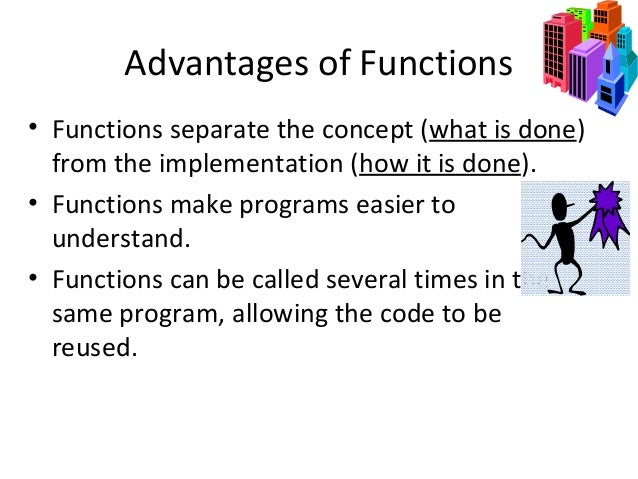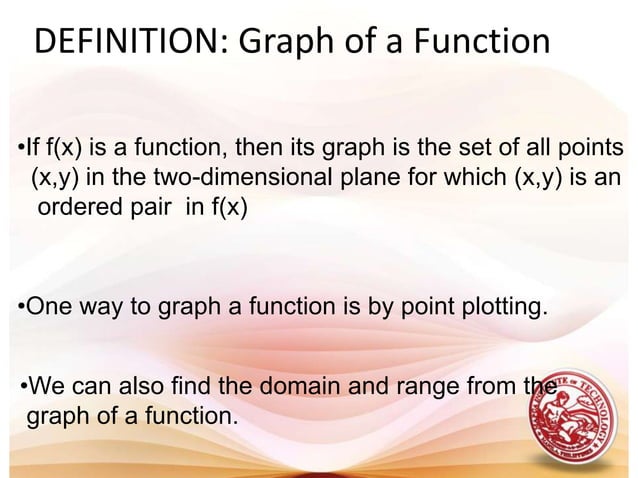Imagine building a house. You wouldn’t start by simply throwing bricks and mortar together, right? You’d likely have a blueprint, a set of instructions detailing the construction process. Functions in programming are like blueprints for your code, providing a structured approach for organizing and reusing code blocks, making your projects more manageable, efficient, and easier to maintain. But how exactly do functions contribute to better coding practices?

Image: www.slideshare.net
Functions are fundamental building blocks in programming, allowing you to break down complex tasks into smaller, reusable units. This modularity brings a plethora of benefits, making your code more readable, maintainable, and scalable. In this exploration, we’ll delve into the advantages of employing functions in your programming journey.
The Power of Reusability
One of the most prominent benefits of functions is reusability. Imagine you’re writing a program to calculate the area of a rectangle. Without functions, you’d need to repeat the same code snippet every time you need to calculate the area. This leads to redundant code, making your program bulky and prone to errors. Enter functions: you can encapsulate the area calculation logic into a function called “calculate_area,” which you can then call whenever you need to calculate the area, saving you time and effort.
Let’s break down an example in Python:
def calculate_area(length, width):
"""Calculates the area of a rectangle."""
return length * width
# Calculate the area of the first rectangle
length1 = 5
width1 = 10
area1 = calculate_area(length1, width1)
print(f"The area of the first rectangle is: area1")
# Calculate the area of the second rectangle
length2 = 8
width2 = 6
area2 = calculate_area(length2, width2)
print(f"The area of the second rectangle is: area2")In this code, we defined a function called “calculate_area” that takes length and width as input and returns the calculated area. This function can be reused with different length and width values to calculate the area of multiple rectangles without having to write the same code repeatedly.
Enhanced Readability and Organization
Functions not only improve reusability but also make your code more understandable and manageable. Imagine writing a program without functions. It would be a continuous stream of code, making it difficult to follow the logic and pinpoint specific functionalities.
Functions act as signposts in your code, clearly defining specific tasks. Each function has a name that describes its purpose, making it easy for you and others to understand what the function does. For instance, a function named “calculate_average” instantly tells you that it calculates an average, without having to dive into the code itself. This clarity makes it easier to debug, modify, and extend your code.
Abstraction and Complexity Management
Functions excel at hiding complex operations behind simple interfaces. Let’s say you’re working with a complex algorithm. Instead of writing all the intricate steps directly in your main code, you encapsulate them within a function. This function then becomes a “black box,” where you only need to know the inputs and outputs, not the internals. This level of abstraction makes your code easier to manage, especially when dealing with large, complex programs.
Imagine you’re developing a game. You could have functions for handling player movement, collision detection, and enemy AI. These functions abstract away the intricate details of each task, making your main game loop much simpler and easier to understand. You can focus on the overall game flow without getting bogged down by the specifics of each individual aspect.

Image: www.slideshare.net
Error Localization and Debugging
Functions significantly streamline the debugging process. Because each function is a separate unit, isolating errors becomes much easier. If you encounter a bug, you can determine which function is responsible and focus your debugging efforts on that specific code segment. This localized approach saves you time and reduces the frustration of sifting through massive amounts of code.
For example, if your game crashes during a collision, you can directly examine the collision detection function instead of scanning the entire game logic for the error. This localized debugging is a powerful advantage when dealing with complex projects.
Team Collaboration and Code Sharing
In a team environment, functions play a crucial role in improving collaboration and code sharing. Functions act as self-contained units of code, making it easier for different team members to work on specific tasks without interfering with each other’s code.
Let’s consider a website development project. One team member might work on the user login function, while another tackles the product listing feature. Because each function is independent, they can work on their specific areas without worrying about stepping on each other’s toes. This modularity also allows for seamless code sharing and integration, even among developers working remotely.
Testing and Modularity
Functions’ modular nature lends itself beautifully to testing. Testing individual functions is significantly simpler than testing an entire program, which can be overwhelming and time-consuming. You can write unit tests for each function independently, ensuring that each part of your code works as expected. This approach is crucial for maintaining code quality and catching bugs early in the development process.
Key Benefits Summarized
- Reusability: Avoid redundant code and streamline development by reusing functions.
- Readability: Improve code understanding by breaking down complex tasks into smaller, meaningful units.
- Organization: Structure your code systematically and improve maintainability.
- Abstraction: Simplify complex operations by hiding details behind function interfaces.
- Error Localization: Isolate and resolve errors more efficiently.
- Team Collaboration: Enhance code sharing and facilitate parallel development.
- Testing: Allow for targeted and efficient testing of individual code units.
What Are The Benefits Of Using Functions
Conclusion
Functions are more than just convenient snippets of code; they are essential tools for building high-quality, maintainable, and scalable software. By embracing their power of reusability, readability, abstraction, and modularity, you can elevate your programming skills and create efficient, robust applications. Whether you’re a beginner or a seasoned developer, the benefits of using functions are undeniable. So, let’s celebrate the elegance and practicality of these fundamental building blocks and continue to harness their power to craft better code.





